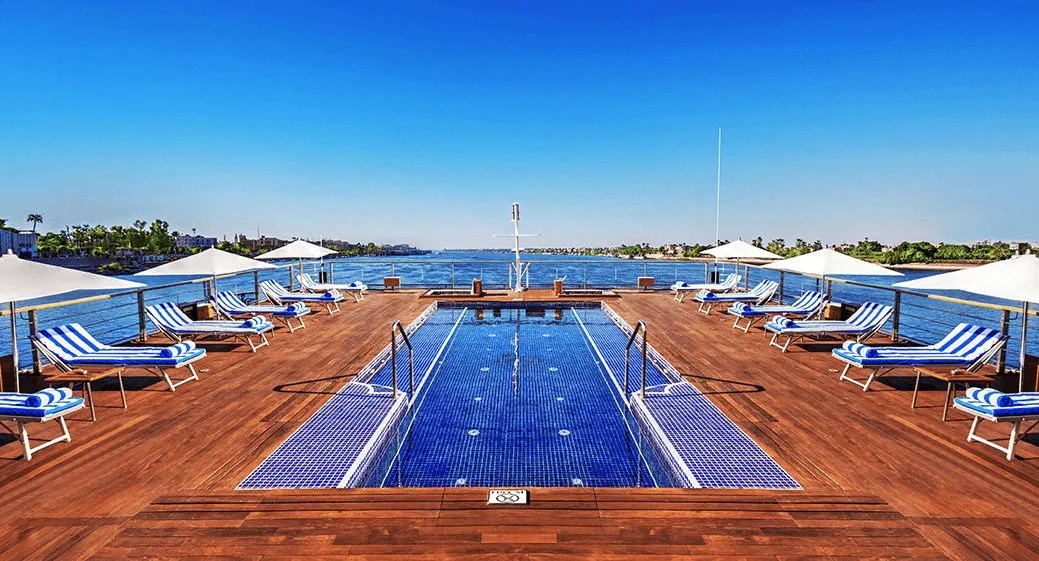It’s hard to resist a bit of amateur sleuthing when you’re on a Nile cruise. As my boyfriend and I boarded the luxury liner Oberoi Zahra, we scrutinised the other passengers like Hercule Poirot might. Was the elegant Chinese-American businesswoman’s young companion her son or her lover? What resentments lay behind the silent mealtimes of the elderly British couple? Were the group of three young couples, who always had their meals together, really just friends? And who was staying in the best suite on the ship, equipped (we spied over the top deck) with a private hot tub?
Is booze less haram than pork? Perhaps it brings in more tax revenues
The itinerary took us from Cairo, via Aswan, then back to Aswan, on a route so well-travelled that, more than once, we saw the same fellow tourists at different hotel bars. Muhammed, our cheerful guide, was in his 26th year of the job and efficiently ushered us around all the best photo spots. British tourism to Egypt is a pretty established thing; at the Temple of Philae, we were shown some 200 year old graffiti – a ‘B. Mure’ had carved his name into a stone slab; ‘stultum est’, some later tourist had added below.
Yet this was no longer the Egypt Agatha Christie knew. In Cairo, the roads were choked up with silver saloons, which forged their own lines in the absence of lane markings, while the occasional camel-drawn cart wove through. Outside each tourist site, mass-produced plastic figurines of Egyptian gods crowded the handmade artefacts. As we glided upstream on the Zahra, freight trains chugged past on the river bank and pylons rose like modern obelisks, delivering electricity from the Aswan dam.
Not all of this change has been organic. Take the dam. Begun in 1960 with Soviet help, it was a statement of ambition – the newly-independent republic wanted to control the Nile’s unpredictable flooding and take advantage of the river’s power, just as it aspired to shape the course of its own future. More striking than the dam itself, which we walked across and peered warily over the edge, was the Arab-Soviet friendship monument that stood nearby, a stone lotus that looked more like some kind of spaceship or futuristic docking station. The flower was one of ancient Egypt’s many symbols for life, but its blade-like petals were distinctly Soviet.
European influences remains, if patchily. In the cavernous dining room of Aswan’s Old Cataract Hotel (a jacket-and-tie affair) we ate seafood risotto as the pianist played the Titanic theme music. At breakfast, we were offered chicken sausages and beef bacon, a halal imitation of the full English (interesting, given how freely the alcohol flowed. Is booze less haram than pork? Perhaps it brings in more tax revenues). At Luxor’s Winter Palace, there was chinoiserie throughout the lobby, reminiscent of a Rococo stately home. Its garden was filled with non-native trees, conquests from other corners of the empire.
Egypt is conscious of its colonial glamour. On the Zahra, both the 1978 and the 2022 versions of Death on the Nile were pre-loaded into the cabin’s TV; in the Winter Palace stood a life-size cardboard cutout of Howard Carter, who discovered the tomb of Tutankhamun. He had stayed at the hotel during his expedition in the Valley of the Kings, just across the river in Luxor, along with his funder, Lord Carnarvon. At the tombs themselves, government-employed guides quietly offer to take the visitor off the beaten track in return for a little baksheesh.
Despite all the antiquity, it’s the flashes of modern Egypt that stayed with me. In the souk in Luxor, we joined crowds of customers and stallholders around flatscreen TVs on the open streets, to watch Egypt play Algeria in the football. At the swish Four Seasons Hotel in Cairo, the flagship restaurant served fashionable Chinese fusion, reinterpreted for the halal palate. What we didn’t see was the elegant Chinese-American businesswoman and her young companion. Perhaps they were back on the ship, enjoying their private hot tub.
Scott Dunn offers an 11 night Egypt itinerary. For more information, please visit www.scottdunn.com or call 020 3808 0416.






Comments